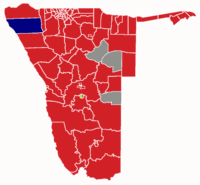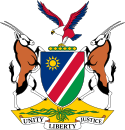2014 Namibian general election
| |||||||||||||||||
1,241,194 registered voters[1] 50%+ votes needed to win | |||||||||||||||||
|---|---|---|---|---|---|---|---|---|---|---|---|---|---|---|---|---|---|
| Turnout | 71.76% | ||||||||||||||||
| |||||||||||||||||
 Presidential election results map. Red denotes provinces won by Geingob, and Blue denotes those won by Venaani. Grey denotes provinces won by other parties. | |||||||||||||||||
| |||||||||||||||||
 |
|---|
General elections were held in Namibia on 28 November 2014, although early voting took place in foreign polling stations and for seagoing personnel on 14 November. The elections were the first on the African continent to use electronic voting.[2][3]
A total of nine candidates ran for the presidency, whilst 16 political parties contested the National Assembly elections. Hage Geingob of the ruling SWAPO party, won the presidential elections with 87% of the vote. SWAPO also won the National Assembly elections, taking 80% of the vote.
Presidential election
Candidates
Originally, incumbent President Pohamba predicted that twenty-two candidates would contest the presidential election.[4] In the end, only nine political parties submitted presidential candidates.[5]
SWAPO
In 2008, the SWAPO Central Committee produced a policy document stating that the party's candidate would be chosen for each election among the top four Committee members. In March 2011 SWAPO declared that whoever was the party's vice-president following the forthcoming party elections would also be the party's candidate in 2014 for president.[8] Some high-level party members, particularly Kazenambo Kazenambo, advocated that SWAPO choose a non-Ovambo candidate, as the first two Presidents, Sam Nujoma and Pohamba, were from the Ovambo people. Others advocated the selection of a woman.[8] SWAPO indicated that the candidate would be chosen democratically in the 2012 party election.[8]
SWAPO was viewed as the clear favorite going into the election.[3]
Parliamentary election
SWAPO announced a gender equality system where women would fill half of their seats in parliament. The party also embraced what it called a "zebra system", whereby if a minister was a woman, the deputy minister would be a man, and vice versa. Because there were more male SWAPO MPs than female MPs, SWAPO put forward plans to expand parliament to remove the risk of male MPs losing their seats as a result of this gender policy.[9]
Results
President
| Candidate | Party | Votes | % |
|---|---|---|---|
| Hage Geingob | SWAPO | 772,528 | 86.73 |
| McHenry Venaani | Democratic Turnhalle Alliance | 44,271 | 4.97 |
| Hidipo Hamutenya | Rally for Democracy and Progress | 30,197 | 3.39 |
| Asser Mbai | National Unity Democratic Organisation | 16,740 | 1.88 |
| Henk Mudge | Republican Party | 8,676 | 0.97 |
| Ignatius Shixwameni | All People's Party | 7,266 | 0.82 |
| Usutuaije Maamberua | SWANU | 5,028 | 0.56 |
| Ben Ulenga | Congress of Democrats | 3,518 | 0.39 |
| Jan Mukwilongo | Namibian Economic Freedom Fighters | 2,514 | 0.28 |
| Invalid votes | 0 | – | |
| Total | 890,738 | 100.00 | |
| Registered voters | 1,241,194 | 71.76 | |
| Source: ECN | |||
National Assembly
Template:Namibian parliamentary election, 2014
References
- ^ "National Voters Register 2014" (PDF). Electoral Commission of Namibia. 7 November 2014. Retrieved 15 November 2014.
- ^ "Namibia to be Africa's first to use e-voting". bdlive.co.za. 15 November 2014. Retrieved 15 November 2014.
- ^ a b Wendell Roelf, "Namibia's ruling party seen winning Africa's first electronic vote", Reuters, 28 November 2014.
- ^ "22 Presidential candidates for Namibian election". The Villager. 21 March 2014. Retrieved 25 May 2014.
- ^ "Presidential Candidates: 2014 Elections" (PDF). Electoral Commission of Namibia. Retrieved 15 November 2014.
- ^ "Swapo in //Karas ready for electoral college". Namibia Sun. 5 May 2014. Retrieved 25 May 2014.
{{cite web}}: External link in|title= - ^ "SWANU Launches Manifesto, Campaign Flyer and Presidential Candidate". SWANU of Namibia. 21 July 2014. Retrieved 29 July 2014.
- ^ a b c Presidential race thrown wide open New Era, 14 March 2011
- ^ Namibia's 'zebra' politics could make it stand out from the global herd The Guardian, 8 July 2014


